Recently, President Donald Trump issued an executive order temporarily banning travel from seven majority-Muslim countries. UA Press connections is a resource linking current events with books published by the University of Arkansas Press that provide timely and accurate research and scholarship:
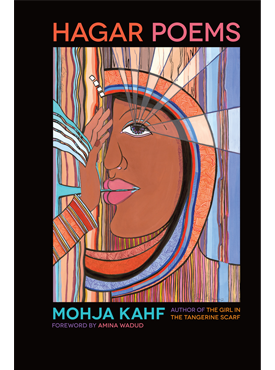 Hagar Poems, by Mohja Kahf. A Syrian immigrant, Kahf is the previous author of The Girl in the Tangerine Scarf and E-mails from Scheherazad. The central matter of her latest collection, published this year, is the story of Hagar, Abraham, and Sarah—the ancestral feuding family of Judaism, Christianity, and Islam. These poems delve into the Hajar story in Islam. They explore other figures from the Near Eastern heritage, such as Mary and Moses, and touch on figures from early Islam, such as Fatima and Aisha. Throughout, there is artful reconfiguring. Readers will find sequels and prequels to the traditional narratives, along with modernized figures claimed for contemporary conflicts.
Hagar Poems, by Mohja Kahf. A Syrian immigrant, Kahf is the previous author of The Girl in the Tangerine Scarf and E-mails from Scheherazad. The central matter of her latest collection, published this year, is the story of Hagar, Abraham, and Sarah—the ancestral feuding family of Judaism, Christianity, and Islam. These poems delve into the Hajar story in Islam. They explore other figures from the Near Eastern heritage, such as Mary and Moses, and touch on figures from early Islam, such as Fatima and Aisha. Throughout, there is artful reconfiguring. Readers will find sequels and prequels to the traditional narratives, along with modernized figures claimed for contemporary conflicts.
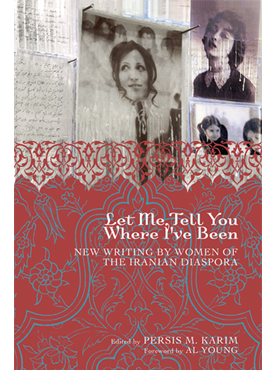 Let Me Tell You Where I’ve Been: New Writing by Women of the Iranian Diaspora, edited by Persis Karim. Until recently, Iranian literature has overwhelmingly been the domain of men. But the new hybrid culture of diaspora Iranians has produced a prolific literature by women that reflects a unique perspective and voice. Let Me Tell You Where I’ve Been is an extensive collection of poetry, fiction, and nonfiction by women whose lives have been shaped and influenced by Iran’s recent history, exile, immigration and the formation of new cultural identities in the United States and Europe.
Let Me Tell You Where I’ve Been: New Writing by Women of the Iranian Diaspora, edited by Persis Karim. Until recently, Iranian literature has overwhelmingly been the domain of men. But the new hybrid culture of diaspora Iranians has produced a prolific literature by women that reflects a unique perspective and voice. Let Me Tell You Where I’ve Been is an extensive collection of poetry, fiction, and nonfiction by women whose lives have been shaped and influenced by Iran’s recent history, exile, immigration and the formation of new cultural identities in the United States and Europe.
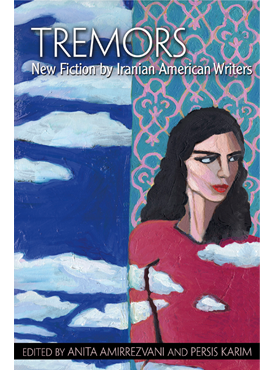 Tremors: New Fiction by Iranian American Writers, edited by Anita Amirrezvani and Persis Karim. This groundbreaking anthology brings together twenty-seven authors from a wide range of experiences that offer new perspectives on the Iranian American story. The authors in Tremors represent the maturing voice of Iranian American fiction from the vantage point of those who were born and raised in Iran, as well as those writers who reflect a more distant, but still important, connection to their Iranian heritage.
Tremors: New Fiction by Iranian American Writers, edited by Anita Amirrezvani and Persis Karim. This groundbreaking anthology brings together twenty-seven authors from a wide range of experiences that offer new perspectives on the Iranian American story. The authors in Tremors represent the maturing voice of Iranian American fiction from the vantage point of those who were born and raised in Iran, as well as those writers who reflect a more distant, but still important, connection to their Iranian heritage.
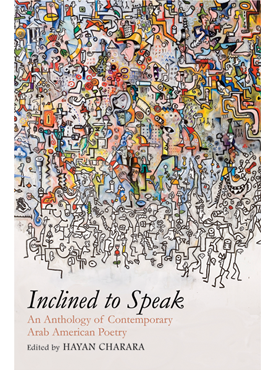 Inclined to Speak: An Anthology of Contemporary Arab American Poetry, edited by Hayan Charara. Here are thirty-nine poets offering up 160 poems. Included in the anthology are Naomi Shihab Nye, Samuel Hazo, D. H. Melhem, Lawrence Joseph, Khaled Mattawa, Mohja Kahf, Matthew Shenoda, Kazim Ali, Nuar Alsadir, Fady Joudah, and Lisa Suhair Majaj. Charara has written a lengthy introduction about the state of Arab American poetry in the country today and short biographies of the poets and provided an extensive list of further readings.
Inclined to Speak: An Anthology of Contemporary Arab American Poetry, edited by Hayan Charara. Here are thirty-nine poets offering up 160 poems. Included in the anthology are Naomi Shihab Nye, Samuel Hazo, D. H. Melhem, Lawrence Joseph, Khaled Mattawa, Mohja Kahf, Matthew Shenoda, Kazim Ali, Nuar Alsadir, Fady Joudah, and Lisa Suhair Majaj. Charara has written a lengthy introduction about the state of Arab American poetry in the country today and short biographies of the poets and provided an extensive list of further readings.
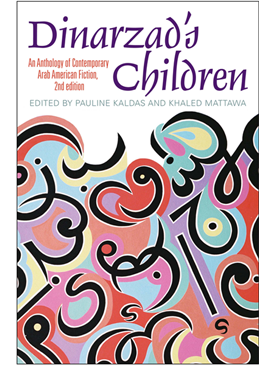 Dinarzad’s Children: An Anthology of Contemporary Arab American Fiction, edited by Pauline Kaldas and Khaled Mattawa. “A timely and moving collection . . . [that] underlines the similarities between recent immigrants and their American neighbors, thus emphasizing all that we have in common beneath the veneer of culture.”—Booklist
Dinarzad’s Children: An Anthology of Contemporary Arab American Fiction, edited by Pauline Kaldas and Khaled Mattawa. “A timely and moving collection . . . [that] underlines the similarities between recent immigrants and their American neighbors, thus emphasizing all that we have in common beneath the veneer of culture.”—Booklist
 Sin: Selected Poems of Forugh Farrokhzad, translated by Sholeh Wolpé. “Poetic modernism came to Iran as late as the 1960s, when Farrokhzad (1935–1967) streaked across the literary horizon. . . . Of course, she became a scandal, one that endures to this day. . . . [T]he poems’ long lines and musical repetitions sweep the reader away as effectively as any American projective verse.”—Booklist
Sin: Selected Poems of Forugh Farrokhzad, translated by Sholeh Wolpé. “Poetic modernism came to Iran as late as the 1960s, when Farrokhzad (1935–1967) streaked across the literary horizon. . . . Of course, she became a scandal, one that endures to this day. . . . [T]he poems’ long lines and musical repetitions sweep the reader away as effectively as any American projective verse.”—Booklist
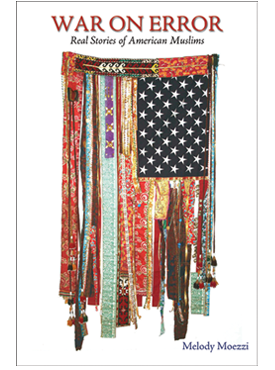 War on Error: Real Stories of American Muslims, by Melody Moezzi. War on Error brings together the stories of twelve young people, all vastly different but all American, and all Muslim.Though each story is unique, each is also seen through the searching eyes of Melody Moezzi, herself an American Muslim of Iranian descent. She finds that the people she interviews are horrified that, in a post-9/11 world, they have seen their religion come to be represented, in the minds of many Americans, by terrorism. These thoughtful and articulate individuals represent the truth about the faith and its adherents who are drawn to the logic, compassion, and tolerance they find in Muslim teachings.
War on Error: Real Stories of American Muslims, by Melody Moezzi. War on Error brings together the stories of twelve young people, all vastly different but all American, and all Muslim.Though each story is unique, each is also seen through the searching eyes of Melody Moezzi, herself an American Muslim of Iranian descent. She finds that the people she interviews are horrified that, in a post-9/11 world, they have seen their religion come to be represented, in the minds of many Americans, by terrorism. These thoughtful and articulate individuals represent the truth about the faith and its adherents who are drawn to the logic, compassion, and tolerance they find in Muslim teachings.
Save
Save
Save
Save
Save
Save
Save
Save
Save

